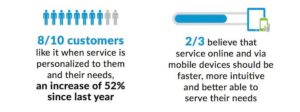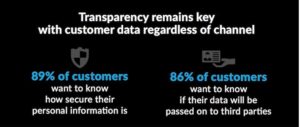Consumers want personalization.
It’s the 21st century equivalent of the place where everybody knows your name. It’s why we love Amazon. It’s why we use mobile wallets and let our browsers auto-save form data. It’s why Facebook is so insistent on wishing me “good morning” and pointing me to my “on this date” posts. It’s a little bit convenience, tossed with customization and seamless transactions, with a chaser of “thank you, someone gets me today.”
But– (You knew there was a caveat coming, right?)
We also want privacy.
And thus the retailer’s dilemma.
Personalization versus privacy in two charts.
A recent Bulldog Reporter article highlights these two competing elements:
“New research reveals that 89% think it is important to know how secure their personal information is, and 86% believe it’s important to know whether their data will be passed on to third parties for marketing purposes. But 80% of consumers said they like service that is personalized to them and their needs.”
In other words:


What this means for your business.
Okay, I don’t have all the answers. But here are three things you should keep in mind:
- Protect customer / client data.
- Be transparent about how you use people’s data.
- Don’t be creepy.
Let’s look first at the first one. Protecting data doesn’t just mean not reselling it, it also means safeguarding the information you receive. While I don’t typically have personal data (the distinction between working primarily with businesses rather than consumers), I am privy to a certain amount of other people’s business data. I protect it online as I protect my own data. And I shred anything proprietary that I print out rather than just tossing it into the trash. Overkill? Maybe. But it provides peace of mind.
Regarding transparency, hopefully this is pretty clear. Tell customers how you will — and won’t — use their data. It’s my quibble with Disney and its magic bands.
And, please, whatever you do — don’t be Samsung.
Finally, back to the personalization vs. privacy dilemma. I wrote a post a few years ago asking whether big data is good for business. It’s ultimately about trust. We trust companies with our data, but we don’t always like how they use it. Like Target, for example.
Just because you know something about a person doesn’t mean you should always act on it. That’s really where respect for privacy (and good judgment) should kick in.
Feature photo by Rafa Garces (Flickr).



